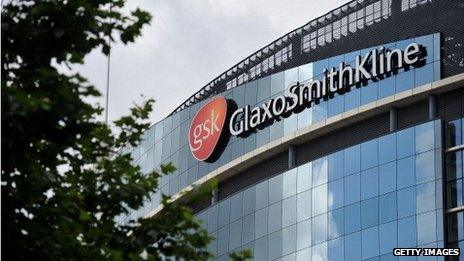GSK’s Chinese headache
- Published
- comments

Sir Andrew Witty, the chief executive of GSK, is a man who has said he wants to put ethics at the heart of the pharmaceutical firm's business.
He has made much of the company's work in Africa and bringing down that continent's drugs bill. GSK's research capability is widely regarded as some of the best in the world.
So, the pain of the allegations coming out of China must be particularly acute.
The contents of the emails sent by the person (or people), known as "gskwhistleblower", to GSK alleging corruption among Chinese sales teams makes for sobering reading. What is striking is the amount of detail, with email addresses, precise drug names and internal projects all written about by someone who clearly knows the business well.
Whether what they say is right, of course, is another matter.
'Employee dismissals'
Two emails sent in January and May last year talk of "aggressive sales tactics", "bribery" and wrongful payments made to thousands of doctors. The emails offer to provide more information.
Following a series of questions sent by the BBC to GSK yesterday, the company responded with its fullest account yet of what it believes has - and hasn't - happened.
"The issues relating to our China business are very difficult and complicated," it said.
"GSK takes all whistle-blowing allegations very seriously and actively encourages whistle-blowers to come forward if they have concerns.
"Investigations into the allegations made in January 2013 about GSK's business in China were conducted over several months with the support of external legal and audit advice.
"Some fraudulent behaviour relating to expense claims was identified, and this resulted in employee dismissals and further changes to our monitoring procedures in China. However, this investigation did not find evidence to substantiate the specific allegations made in the emails."
The key for Sir Andrew's reputation is how he handled the allegations once they came to his attention.
Incendiary emails
GSK says it used both in-country and international investigators - freeing them from the allegation that the Chinese arm of the business (accused of systematic corruption) was simply investigating itself.
I understand that a report was completed by May or June 2013 that did find irregularities, but nowhere near the scale alleged in the email.
The fact that Peter Humphrey, the investigator hired by GSK to look at the separate issue of a covert video recording of a senior GSK China executive, Mark Reilly, having sex, found that the allegations were "credible" does not help Sir Andrew.
Mr Humphrey, who is now in detention in China, appears to have had limited access to GSK material beyond that pertinent to the tape - the existence of which was first revealed by The Sunday Times last weekend.
'Cheated'
Which raises the question - if he was investigating the sex tape which was part of the overall allegations against GSK in China, why wasn't he given the other incendiary emails earlier in the process?
Mr Humphrey sent a message from prison - seen by the BBC - which says that he feels "cheated". GSK has some serious questions to answer about how it treated Mr Humphrey, who is facing trial next month, possibly in secret.
It wasn't until the Chinese authorities announced their own investigation into allegations of corruption within GSK in July that the business made any public comment.
Asked about this lengthy delay, GSK said: "We inform the financial markets in relation to all material matters following internal and external legal advice. We are confident we have satisfied all our disclosure requirements."
Wider issues
So far, GSK's share price has hardly flickered since the allegations became public. Investors will be waiting to see the level of any fines the Chinese authorities might impose before voting with their wallets.
And whether anything uncovered reveals wider spread issues about GSK operates. Don't forget, in 2012 GSK was fined $3bn in America for fraudulently promoting drugs for unapproved use and failing to report safety data to the Food and Drug Administration.
The company insists it has radically changed its processes since then - both in America and China.
And it appears that at present the board is satisfied with how GSK's executives are handling the investigation.
China is a small part of GSK's global operations, accounting for about 3% of its revenues.
It is well behind the other big foreign players in the rapidly growing pharmaceutical sector. Astra Zeneca and Pfizer, subject of a takeover battle earlier this year, are the leading foreign drug providers in the country.
But GSK does want to keep hold of its licence. The Chinese three tier market (research and development, manufacturing and consumer) is an increasingly valuable one.
Sir Andrew does not want to pull out. He must hope that the Chinese authorities' findings come quickly and do not reveal anything which the company failed to uncover.